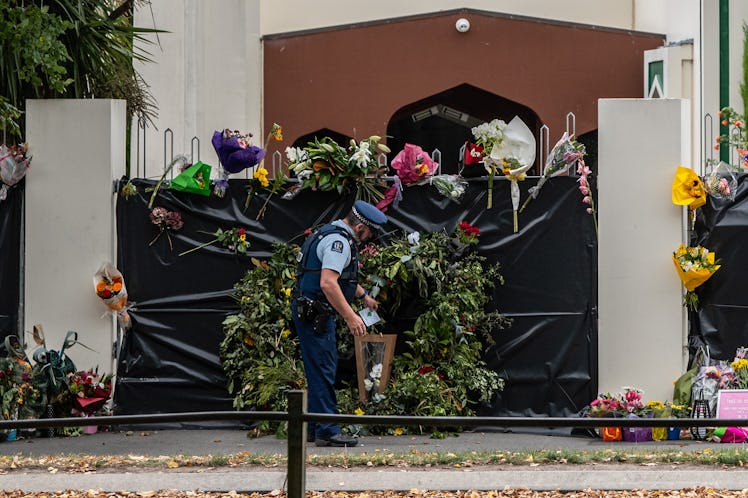
New Zealand Is Taking Action On Gun Control Less Than A Week After A Mass Shooting
New Zealand is still reeling from the mass shootings that occurred at Al Noor Mosque and Linwood Mosque in central Christchurch on March 15, killing 50 people. But as the nation mourns, it's also already moving towards action. Less than a week after the tragedy, per The Washington Post, the country's Prime Minister Jacinda Ardern said New Zealand will ban semi-automatic guns, marking a major step in gun reform for the country.
Just six days after the attacks on the Christchurch mosques, Ardern announced during a news conference on March 21 that New Zealand is moving to strengthen their gun laws, according to CNN. She said,
On 15 March our history changed forever. Now our laws will too. We are announcing action today on behalf of all New Zealanders to strengthen our gun laws and make our country a safer place.
Ardern went on to say that New Zealand will "ban all military-style semi-automatic weapons," as well as assault rifles, according to CNN. "Every semi-automatic weapon used in the terrorist attack on Friday, will be banned in this country," said Ardern.
The government is working towards introducing formal legislation for its gun reform proposal to be introduced to parliament on April 1. Ardern explained, however, that a decision on the new legislation might not be settled until April 11, and the government doesn't want "irresponsible dealers" to be able to continue selling weapons, so she and her cabinet set up a plan for the interim. Per CNN, New Zealand Governor General Patsy Reddy signed an order to reclassify some semi-automatic weapons, requiring a higher level license to own these types of guns legally. In the meantime, the country is reportedly setting up drops at police stations for citizens to safely surrender guns. Ardern did mention that there will be some sort of buyback, but the details of that have yet to be laid out in full, per CNN. The Associated Press also noted that an immediate sales ban was in effect, to prevent stockpiling of weapons.
The gunman who attacked the mosques reportedly used five guns, two of which were semi-automatic and reportedly owned legally on a Category-A gun license, according to Bloomberg, which also notes that a legal loophole made it easy to modify the guns into military-style weapons with an "unregulated" high capacity magazine. Ardern assured the country during her news conference Thursday that parts that "cause a firearm to generate semi-automatic, automatic or close-to-automatic gunfire,” will also be banned, according to The New York Times.
Prior to the move, New Zealand's gun laws were very similar to those in the United States, as the only two developed countries without universal gun laws, per GunPolicy.org. The United States also has its own troubling history with mass shootings and modified weapons. In recent years, some of the high-profile shootings include the December 2012 shooting at Sandy Hook Elementary School in Newtown, Connecticut that killed 26 people; the Pulse shooting at an Orlando, Florida, nightclub in June 2016, which killed 49 people; the October 2017 Las Vegas concert shooting that took 58 lives; and the shooting at the Marjory Stoneman Douglas High School in Parkland, Florida, that killed 17 people in February 2018. According to a Feb. 1 report from gun policy reform advocacy group Everytown for Gun Safety, some 36,000 Americans die annually from gun violence. However, the response regarding gun policy has been vastly different, with most attempts at changing federal gun control policy failing, even following mass violence.
Gun policy reform activists have advocated for what they often call "common sense" changes, including public funding for research into gun violence, bans on semi-automatic weapons, and universal background checks. Currently, certain sales of guns — like those at gun shows or between private citizens — do not require a background check under federal law.
The biggest move toward gun policy reform in recent years is relatively minor. In 2018, President Donald Trump's administration moved to ban bump stocks, which are attachments that modify semi-automatic rifles to be able to shoot with the capacity of a machine gun. The move followed the 2017 Las Vegas shooting, in which the gunman reportedly used a bump stock on 12 of his rifles, according to CNN. A new federal regulation officially banning bump stocks is set to go into effect on March 26. However, things are still up in the air as some gun rights advocacy groups have already lined up to fight the ban.
America has seen too many shootings over the last few years, and it's inspiring to see New Zealand take action. It's one more step to hopefully never seeing this kind of tragedy again.